















Members’ priorities clear as public sector talks to begin


Built tough
HEU celebrates 80 years with history series | 8
A silver lining
B.C. led outcomes in seniors care during COVID, report shows | 3
More time to help members
New dedicated stewards a bargaining win for union | 5


Making more ways for members to get involved | 6
President’s Desk
We can’t take our labour rights for granted in Canada | 6
Proud, strong, delicious
The creative spirit of HEU’s 80th anniversary cake contest | 11
Public sector agreements to expire in March, preparation starts
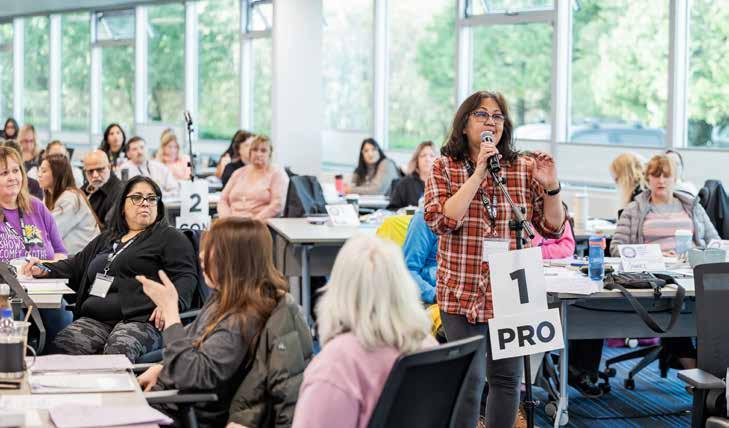
ON March 31, 2025, collective agreements covering more than 60,000 HEU members will expire.
That’s why HEU hosted three public sector bargaining conferences in November, drawing hundreds of delegates from across the province to debate and vote on bargaining demands, identify priorities, and elect bargaining committees for the facilities, community health, and community social services subsectors.
Early planning – including prebargaining membership surveys – extensive research, and working collaboratively with other public sector unions are key contributors to successful contract talks.
“HEU was very well-prepared going into the last round of bargaining,” says HEU secretarybusiness manager Lynn Bueckert.
“I think that’s one of the underlying reasons we were able to achieve monumental gains for our members.”
Bueckert adds that regular and open communication among the public sector unions strengthened the positions of each bargaining association by presenting a united front and security in numbers.
HEU’s Community Bargaining Association (CBA) members met at the union’s provincial office in November.
Bargaining proposals included wages, premiums and allowances; health and welfare benefits; paid leaves; stability, recruitment and retention; safety at work, including safe-staffing and respectful workplaces; and union rights.
Delegates also elected David Huespe and Brenda Orencia to the bargaining committee.
HEU represents 1,500 members in the multi-union Community Social Services Bargaining Association (CSSBA). Both CSSBA and CBA tables are led by the BCGEU.
Delegates identified bargaining priorities as wages, premiums and allowances; parity with the facilities subsector; safety at work, including improvements to psychological supports and crisis counselling; safer staffing levels and workload; and more paid leaves.
HEU’s newly elected CSSBA bargaining committee includes Nicole Russell and Lisa Bouma.
The facilities subsector is the largest bargaining association within HEU, representing about 56,000 members, and more than 230 local delegates met in Surrey to prepare.
With more than 800 bargain-
ing proposals submitted, delegates spent two days in passionate debate. Several key priorities were adopted for the incoming bargaining committee, with the continued fight for pay equity a key proposal.
Delegates also discussed and passed demands related to workplace safety, sending a message to employers that there must be substantial commitment to protect health care workers in B.C.’s most dangerous workplaces.
Plus, delegates also clearly rejected the idea of negotiating a working-short premium. Instead, after a lengthy debate, they supported provisions requiring employers to fully replace absent staff and increase existing staffing levels.
Other bargaining proposals passed include improving provisions related to the trades-qualification premium, compensating members for training, mentoring and perceptoring, improving scheduling, overtime and leave provisions, and bolstering existing working-from-home language.
Ten members were elected to the bargaining committee: Jesse Winfrey, Barb Owen, Nikki Kowalchuk, Chena Binns, MJ Brown, Tara Heller, Landon Beggs, Monica Thiessen, Maryann Pyne and Seema Loodu.
BRENDA WHITEHALL

Lynn Bueckert | Secretary-Business Manager
We must send a clear message to health employers that we are absolutely united in our commitment to achieve critical gains across all three public sector agreements.
IN THE last round of bargaining, HEU and the other big health care unions secured the best public sector settlements in all of Canada.
Together, we achieved the richest wage increases and the best built-in cost of living protections in the public sector in years.
These achievements – along with other new and expanded provisions for HEU members across the three main public sector health agreements – were significant accomplishments and something we can be genuinely proud of.
Yet, as we all know, there is still much more to do in the next round of contract talks.
The good news is there are several key factors that strengthen our position.
First, HEU leads negotiations for a renewed Facilities collective agreement for members – and at the same time, we are coordinating our overall approach to bargaining with other public sector unions through the BC Federation of Labour.
Second, our members are strong, united, and determined to make things better for working people and get the best agreements possible.
Third, B.C. has one of the lowest debt-to-GDP ratios among Canadian provinces, so there is no barrier to continued investment in public health care.
And fourth, public health care is the single largest employer in the province, creating more than 100,000 family-supporting jobs in the last ten years that contribute significantly to the B.C. economy.
Yet, we also know we are battling a powerful and influential tide of conservative forces here and around the planet.
Forces that see the public sector as a drain on our economy and generally have no respect for the role of the public sector in our lives.
But cuts and privatization were soundly rejected by B.C. voters last fall. Instead, British Columbians chose a government that would get them the care they need, when they need it.
And with a worker-friendly BC NDP government back in power in Victoria, we have a strong partner to work with.
Still, bargaining is going to be challenging. That’s why we must send a clear, unambiguous message to health employers.
A message that we are absolutely united in our commitment to achieve critical gains across all three public sector agreements.
That’s how we achieved so much in the last round.
And that’s how we will secure a fair collective agreement this time.

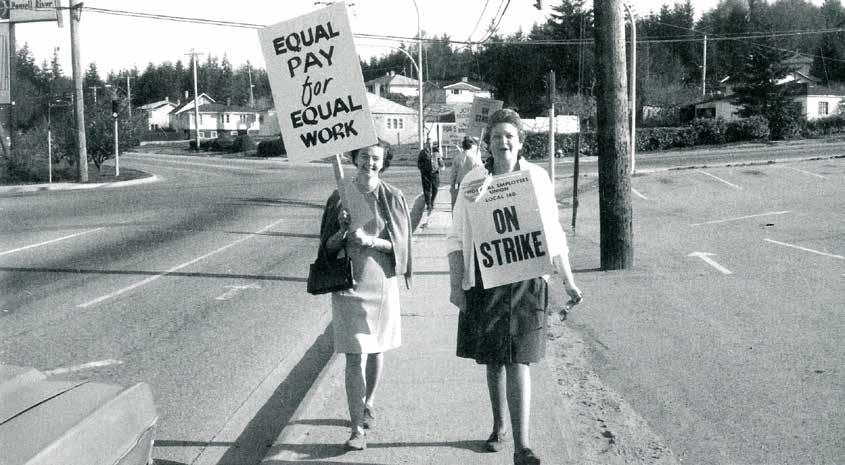
A VALIANT FIGHT FOR A FIRST CONTRACT
HEU’s first strike didn’t take place at a hospital, but at a small privately-owned medical clinic in the coastal community of Powell River.
The clinic was certified in December 1970, but by the following March negotiations had broken down, with the employers refusing to recognize union security, dues checkoff, annual vacations, and other basic rights.
The members – just five clerical workers – walked the
line for 14 months, supported by local trade unions like the pulp mill workers, and visits from HEU leaders.
But in May 1972, the decision was made to end the strike. “The dispute reduced itself down to a ‘David and Goliath struggle’ between working people trying to organize a union and the doctors-owners of the clinic,” reported the 1972 Guardian. “For the moment, Goliath has won.”
Your union. Your paper.
B.C. response led to better outcomes during pandemic
FROM Vancouver to Venice, from Kelowna to Kathmandu the COVID-19 pandemic struck the globe in 2020, leaving devastation in its wake. Economies stalled. Health care systems buckled. And millions of lives were lost, while countless others were shattered.
As Canada struggled with these challenges, B.C.’s response in longterm care (LTC) stood out as a beacon of leadership showing that government action could make a critical difference in safeguarding seniors.
Released this past September, HEU’s report, titled Long-term Solutions for Long-term Care: Analyzing provincial COVID-19 responses, compared pandemic policies in B.C., Alberta, Ontario and Quebec, and identified three key policies behind B.C.’s. better outcomes: single-site orders, wage standardization, and paid training for care aides.
Limiting the movement of workers between multiple sites—B.C. was the first province to implement single-site orders—reduced the risk of cross-contamination, a policy other provinces were slower to adopt.
“It probably didn’t feel like B.C. was the best place to be doing this work at the time, but we saw some measures put in place, including wage levelling, that saw us outperform other provinces,” said Lou Black, HEU’s director of research and policy.
HEU’s Solidarity Summit is coming to the Interior in 2025, at Thompson Rivers University in Kamloops June 8 to 13.
Formerly known as Summer School, this event will bring together 200 HEU members to learn, connect and build confidence.
Held every two years, the school aims to create greater understanding about workers’ collective power and strength, how to build inclusive, solidaritybased relationships, and the skills to defend our workplace rights.

SETTING A STANDARD | Collaborative public policy at a critical time made a difference in protecting vulnerable seniors in British Columbia.
B.C. was the only province to eliminate wage disparity between public and private sector workers, ensuring a standard wage for all care aides to stabilize the sector.
HEU members worked extremely hard throughout the pandemic, giving seniors in care their best, and making great sacrifices during a frightening and stressful time.
The Health Career Access Program (HCAP) was implemented quickly and offered a more sustainable and successful approach to
The union welcomes 255 new members who made HEU their union of choice last fall.
HEU now represents 120 housekeepers, care aides and dietary aides at Menno Apartments in Abbotsford, and 58 housekeepers, food servers and cooks at Ross Place in Victoria.
We also welcome 70 new housekeepers, care aides, dietary aides, and other health team members at Tsawaayuus (Rainbow Gardens) in Port Alberni, and ten support workers at April House in Comox.
training than those initiated in other provinces. Since it began, 8,000 care aides have graduated from HCAP.
While lack of optimal staffing levels in LTC remain a concern, wage levelling and HCAP appear here to stay.
“Being a care aide is an incredibly rewarding career path. It is one where every single shift, every single day you are on the floor, you make a proud difference in someone’s life,” said provincial executive member Shivonne
St.Pierre, an HCAP graduate and HEU care aide.
The findings also serve as a case study for HEU’s allies in other provinces, to show the benefits of their governments adopting similar approaches to staffing.
“This report clearly demonstrates that improving wages and working conditions for health care workers leads to better care and living conditions for seniors,” said CUPE National president Mark Hancock.
SHAHEEN SHIVJI

A RECENT decision by the Labour Board confirmed that internal union business is confidential, and that employers have only limited rights to investigate a union’s meetings and discussions with members.
The case was brought by the BC Teachers Federation, and involved an email sent by an elected union official inviting members to a meeting and asking them to report any concerns about lack of support or harassment and discrimination by the employer.
Two teachers later approached the employer claiming that the union official had made negative comments about the school principal at the meeting. The employer started an investigation and asked to interview members about the email and the discussions that took place at the meeting. The union brought an unfair labour practice complaint.
The Board found that the employer had the right to start an investigation into a potential breach of its respectful workplace policies, but that it had breached the Labour Code by inquiring into the content of the meeting.
The email and the comments made by the two teachers were not enough to justify the employer’s inquiries, and the union was entitled to look into potential breaches of the collective agreement and to have candid and confidential discussions with members about workplace concerns.
This decision offers strong support for the rights of union members and elected union officials to advocate for better working conditions without employer interference.

BUILDING on HEU’s long-standing commitment to equity and justice, 2018 convention delegates adopted a path forward to guide diversity, equity and inclusion. Since then, the union has continued learning, growing and creating change.
One historic move was revising HEU’s Constitution and By-Laws to add six diversity vice-president seats to the Provincial Executive, improving leadership voices of equity-seeking members at decision-making tables.
To deepen diversity, equity, inclusion and accessibility (DEIA), HEU’s 2021 convention delegates passed groundbreaking resolutions to make union spaces safer, and remove obstacles preventing equity-seeking members from fully participating in their union.
The results are chronicled in a comprehensive research report called Identifying and Addressing Barriers – Building the Capacity of HEU, available at heu.org/barriers.
Who are we?
More than 90 per cent of HEU’s 60,000 health care workers identify as belonging to an equity-seeking group – including women, non-binary, transgender, people of colour, disabled, young workers, 2SLGBTQIA+, Indigenous, and/or Black.

To recognize HEU’s diverse membership, seven equity standing committees were established. They are: Ethnic Diversity (people of colour); Indigenous Peoples; Older Persons (55+, adopted at 2024 convention); People with Disabilities; Pink Triangle (2SLGBTQIA+); 2-Spirit, Women and NonBinary; and Young Workers (up to age 35).
Together, these committees advocate for social justice, gender rights and economic equity; raise awareness about the physical, emotional and mental hazards of racism, discrimination, homophobia, transphobia, sexism, ableism, ageism, and more; lobby for improvements to accessibility, disability benefits and resources; and promote safe and harassment-free workplaces.
Here are some important resources about your rights.
Find your HEU shop steward: 1-800-6635813, heu@heu.org, or contact your joint occupational health and safety representative. Employers are required to post these contacts at workplaces.
You can also check out HEU’s Equity Statement and Human Rights Policy, the B.C. Human Rights Code, the Canadian Charter of Rights and Freedoms, and the B.C. Human Rights Clinic available on HEU’s website: heu.org/equity-and-human-rights.
HEU’s newly-created rotation support team helps locals in the facilities subsector propose changes to their shift rotations.
This project emerged from the last round of FBA negotiations, as an agreement between the employer and the union. It allows workers, as a group, to initiate changes, and requires the employer to provide the information needed to develop a schedule.
The goal is to build optimized rotations that balance the priorities of members, the union and the employer.
The agreement provided funding for two rotation specialists on HEU staff, and the development of tools, guides and tutorials.
More than 50 work sites have taken part in this process, including members working in longterm care, emergency, lab, pharmacy, kitchen and maintenance.
Once the employer approves the proposal, it must be affirmed by a 75 per cent vote of the regular employees.
Members who are interested in beginning this process at their local should start by contacting their shop steward.
HEU has reached a major milestone with the introduction of 21 full-time dedicated shop steward positions at 17 of the largest worksites across the province.
This initiative, secured during the last round of Facilities Bargaining Association negotiations, represents a step forward in supporting members and fostering fairer workplaces.
“Having dedicated shop stewards is a game-changer,” explains HEU secretary-business manager Lynn Bueckert. “Shop stewards have to juggle their union responsibilities alongside their regular jobs. But at the 21 worksites with these dedicated positions, stewards can focus entirely on advocating for members and upholding the collective agreement.”
For Anju Lal, a dedicated shop steward at Vancouver General Hospital, it means she can help members right away. “Dedicated stewards have the time and flexibility to meet with members, address issues promptly, and really focus on advocating for their rights,” she says. Why dedicated stewards matter for members
“When I started in this role, I realized how much faster we could resolve issues with HR and management,” says Bonnie Hammermeister, a full-time steward at Surrey Memorial and HEU Fraser Region vice-president.
“Dedicated stewards have the ability to build relationships and spot patterns in workplace challenges, which helps us get ahead of problems before they escalate.”
Hammermeister points out that
A new workshop series designed for members at new HEU locals was launched in January.
Worker Rights Wednesdays, developed by the HEU education department, offers a monthly one-hour webinar for new members to learn about their union.
Topics include health and safety, bargaining a collective agreement, advocating for worker rights and building strong locals.
If you have joined HEU within the last year, make sure we have your email address — go to heu.org/change-contact-information.
issues with sick time, vacation scheduling, and wages often arise, but having a steward onsite ensures members know their rights and receive timely assistance.
Employers, too, have noted the value of dedicated stewards. “The consistency helps both sides,” says Lal.
“Management listens to us more because they know we’re trained and focused on resolving issues collaboratively. This improves relationships and creates smoother processes for everyone involved.”
Dedicated shop stewards are the first point of contact for members
facing workplace challenges. They mediate disputes, educate members about their collective agreement rights, and collaborate with HEU servicing representatives on complex issues.
The role is rewarding but comes with challenges.
“It can be emotionally draining when members come to us in distress,” says Lal. “We’ve learned to manage those emotions and focus on finding solutions. HEU’s training and mentorship have been invaluable in helping us navigate these situations effectively.”
This program is a significant victory for HEU. It ensures members at these sites have easier and more
timely access to representation. “This is life-changing for many workers,” says Lal.
Both Lal and Hammermeister hope the program will expand in the future. “We’d love to see every local have a full-time steward,” Hammermeister says.
Adding more dedicated shop steward positions is a key demand in the upcoming round of FBA bargaining. Expanding this program will further strengthen HEU’s ability to support members and ensure fairness in workplaces across the province.
SARA ROZELL
FULL TIME FOCUS | For Anju Lal from the Vancouver General Hospital local, being a dedicated steward means she’s able to help members more quickly, and keep the process moving smoothly.
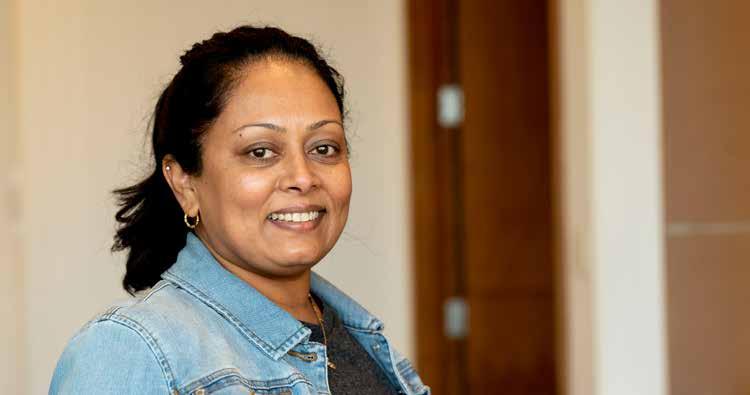
In HEU’s independent sector, the bargaining never stops! Almost 40 collective agreements were negotiated in 2024, including 12 first agreements.
Some of our 180 independent agreements are negotiated directly with nonprofits or private operators, while many others are with corporate care contractors. HEU members at these locals serve on their bargaining committee, supported by the union’s professional bargaining staff.
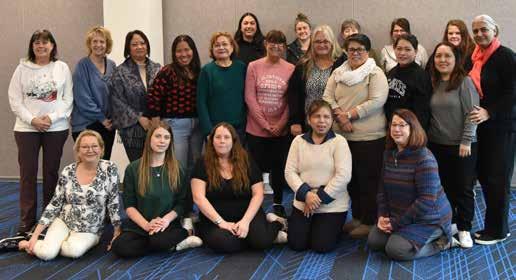
WORKING FOR YOU
THE WCB/LTD team advises and represents members appealing WorkSafeBC and long-term disability decisions that deny or terminate their benefits. They also deliver member education, and make submissions on new WorkSafeBC legislation and policies.
This tenacious team includes (from left) admin assistant Tracie, appeals reps Bob, Pamela, Alex, Michelle (who serves as team lead), Karen, Simran and Karen. Missing from the photo are appeals rep Niki and admin assistants Susana, Wendy and Stephannie.
Betty Valenzuela | Financial Secretary
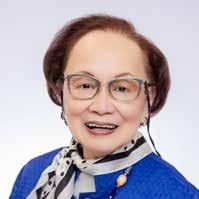
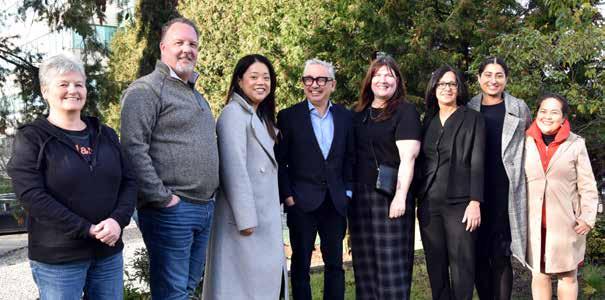
Barb Nederpel | President
As health care workers know, the work never stops, and 2025 is shaping up to be a very busy year for the union.
2024 was a very busy year for HEU.
We celebrated our union’s 80th anniversary, gathered members at our biennial convention, helped elect another worker-friendly provincial government, and kick-started the next round of public sector bargaining.
But as health care workers know, the work never stops.
That means that for us, 2025 is shaping up to be an equally hectic year, as our union continues the important work of fighting for better working conditions for health care workers and fostering a strong union movement.
What excites me most about this coming year is the vast array of opportunities for members to get involved in the union. This is because building a union means constantly bringing in new activists and leaders.
With an equity conference in March this year, many members who have never before attended an HEU event will have an opportunity to connect with other HEU members. From that conference, we’ll be seeing a new cohort of union activists taking on leadership positions in HEU’s equity standing committees. And I, for one, cannot wait to start working with them!
This June, HEU will be hosting a Solidarity Summit in Kamloops for HEU members from across the province. Traditionally known as “HEU Summer School,” this week-long gathering is for members who want to deepen their union activism and gain new skills to better advocate for their co-workers.
And as always, I encourage HEU members to get involved with your local. This spring, locals will be electing their executives. There are many different roles on a local executive that help keep HEU locals running smoothly and serving members.
These are great opportunities for members to dip their feet in the union and learn how to best represent our co-workers. My time as the secretary-treasurer of Vancouver General Hospital local is one of the most cherished times of my life.
Get in touch with your local; stay informed about meetings, elections and HEU events. Our union is only as strong as our locals!
Whether you’ve worked at an HEU site for decades, or you’re new to HEU, now is always the best time to get involved.

The next political challenge is coming — there is a rise in anti-union politicians in our country and around the world.
IN NOVEMBER, I attended the Public Services International conference in Bogotá, Colombia.

There, I heard firsthand about workers facing monumental barriers, as they tried to exercise the most basic union and human rights.
In some countries, workers legally have the right to unionize and bargain, but they face threats, violence, and even death for trying to organize. In others, women and children workers are used as human shields to bust down picket lines, while union leaders simply disappear without a trace for defending labour rights.
Yet, amidst this adversity these incredible activists persist.
It’s hard to believe we could ever face these challenges in Canada.
Yet, we all know, that in 2002, the BC Liberal government passed a devastating piece of legislation that ripped up our contract, privatized health care jobs, and ignored decades of bargaining progress.
Back then we fought back and secured a landmark 2007 Supreme Court decision, where Canada enshrined collective bargaining as a fundamental right under the Charter of Rights and Freedoms
But our rights are constantly under threat.
We face back-to-work legislation, essential service designations, contracting out, and more recently the use of the notwithstanding clause by some Conservative premiers to bypass workers’ charter rights.
That’s why we must keep fighting – at the bargaining table, in the courts, on the picket lines and at the ballot box.
Political activism makes a difference
Just look at the success of the recent provincial election. Our HEU Votes campaign was the difference in securing four more years for building a stronger public health care system under the BC NDP.
But the next political challenge is coming.
There is a rise in anti-union politicians in our country and around the world. And the next threat to workers that HEU must take head on is Pierre Poilièvre and his federal Conservatives.
Poilièvre has supported anti-worker legislation before and he will put unions on the chopping block again, if elected prime minister. Plus, the last time he was a key cabinet member of the federal Conservative government under Prime Minister Stephen Harper, we saw big cuts to health care transfers and support for privatization.
That’s why we can’t let Poilièvre walk away with the next federal election.
And as the Bogotá speakers reminded me, through solidarity, our union can achieve anything.

AS HEU marked its 80th anniversary in October, more than 800 delegates gathered from across the province for the union’s biggest-ever convention.
Held at the Vancouver Convention Centre, delegates passed several constitutional amendments and resolutions, elected a new Provincial Executive, and heard from several guest speakers, including B.C. Federation of Labour President Sussanne Skidmore, NDP Leader Jagmeet Singh, CUPE National president Mark Hancock and secretary-treasurer Candace Rennick, and B.C. Premier David Eby.
President Barb Nederpel and financial secretary Betty Valenzuela were re-elected to the offices they’ve held since 2018. And secretarybusiness manager Lynn Bueckert was ratified by convention delegates.
The full 2024-2026 Provincial Executive can be found on page 10.
During the week, delegates debated and voted on a number of constitutional amendments and resolutions.
The union’s rules for governing can only be changed at convention by an amendment to the HEU Constitution and By-Laws and it requires a two-thirds’ vote of all delegates to be adopted.
Resolutions, however, are policy decisions that establish the union’s position on issues, which may include union matters or external issues, and are adopted by a majority vote.
Newly adopted constitutional amendments include: the creation of an Older Persons Standing Committee (for workers 55+); an increase to death benefits; and raising the age of Young Workers to 35.
Some new resolutions include: lobbying the federal government to support unions in the Philippines, and providing single-occupancy accommodations at HEU events.
Delegates passed a motion to refer all outstanding constitutional amendments and resolutions to the incoming Provincial Executive.
Each academic year, HEU awards a number of bursaries, sponsored by union locals and HEU’s Provincial Executive (PE). They’re available to members, their children, stepchildren and legal guardians, and spouses, including common-law and samesex partners, who need financial assistance and demonstrate satisfactory academic standing. They can support courses at any post-secondary educational institution and are administered by a bursary committee under the
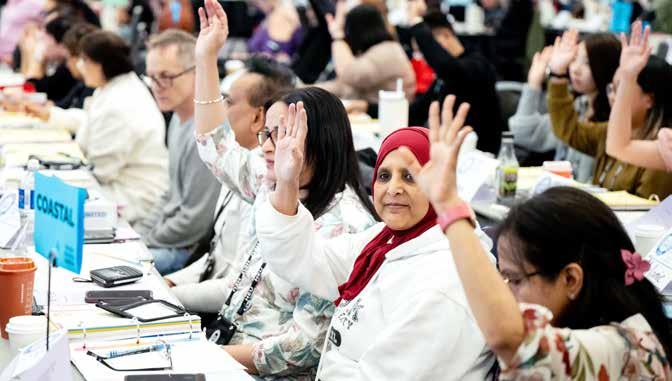
Special convention awards were handed out to recognize HEU members’ contributions to their work sites and communities.
The Good Samaritan Bargaining Committee members were presented the Convention Gavel for their long and difficult fight for a fair contract covering 1,100 members at seven work sites.
With a 98 per cent strike mandate, they were able to pressure the employer for a collective agreement that included no contracting-out language and wage-levelling protections.
The Mary LaPlante Sisterhood Award was presented to care aide Dolie Bulalakaw of the Hopehill Assisted Living Pro Vita site for her lobbying efforts to improve seniors’ care and affordable housing for workers.
The HEU Social Justice Award was presented
PE’s direction. Here are the 2024 – 2025 recipients and their sponsoring locals:
$500 bursaries: Ashely Atwell (PE), John Diazon (PE), Joven Gill (PE), Kathy Huang (PE), Merlin Joseph (PE), Kenneth Miquiabas (PE), Miranda Raposo (PE), Jocelyn San Mateo (PE), Natasha Schappert (PE – Alex Patterson Memorial), Katelyn Cheong (Vancouver General), Hasel Joy Lucas (Vancouver General), Carly Dyson (Royal Jubilee), Jaiden Christie (St. Paul’s – Robert Standell), Sanam Moazed (PHSA Amalgamated – Cathy Peters
to Claudia Alejandra Zamorano Gomez (housekeeping supervisor, Royal Columbian Hospital) for her advocacy to protect the rights of migrant workers, and her fight to get permanent residency status for her family on humanitarian and compassionate grounds.
The HEU Disability Rights Award was presented to Royal Columbian rehabilitation assistant Yu-Jen (Kirk) Wang for his tireless advocacy for better mental health support for workers.
And care aide Teresa Roe of Langley Memorial Hospital received the Indigenous Reconciliation Award recognized for her dedication to advocating for Indigenous representation and reconciliation, raising funds for the Indian Residential School Survivors, promoting Indigenous culture, and demystifying stigmas.
BRENDA WHITEHALL
Memorial), Alyanna Amongo (Richmond), Haley Hey Lam (Burnaby), Cody Mescallado (Royal Columbian – Beckie Dyer), Olivia Monge (PE – Ginger Goodwin), Sarah Forsberg (Maple Ridge –Tara Hansen Memorial), Reynaldo Almarez III (Royal Columbian – Bill Black), Amanda Cole (Prince George), Alana Bonderud (People with disAbilities Standing Committee – Cathy Peters Memorial), Isabella Domingo (UBC), Kiara Hosie (Victoria General).
$1,000 bursaries: Manilyn Ceballos (PE), Yuet Pao (PE), Jaleigha Ebens (PE), William
Fenyo (PE), Maria Camila Gonzalez (PE), Kendra Hine (PE), Sarah How (PE), Christy Hunter (PE), Sylvia Keszthelyi (PE), Shalen Perry (PE), Blake Plaxton (PE), Brooklyn Puska (PE), Lilac Quiapo (PE), Heart Sayam (PE), Mallory Scrivens (PE), Amisha Shedhai (PE), Ajay Sidhu (PE), Agnieszka Sliwinski (PE), Jade Stewart (PE), Ethan Tang (PE), John Wein Tuzon (PE), Mey(Linda) Vong (PE), Jacob Wong (PE), Jose Erispe (Surrey – Iris Andrews Memorial), Sri Guna Reddy (PE –Ray McCready Memorial), Simrana Singkh (PE and Surrey – Edward James Ashmore Memorial).
OUR UNION IS BUILT on 80 years of our hard-working members bargaining tough contracts, opposing unjust laws, pushing back against government cuts that target working people, and speaking out for public health care.
The faces and names — and the fashions — have changed, but HEU members of the past were inspired by the same vision we hold in our hearts today.
To celebrate our 80th birthday, we chose eight of our many stories, struggles and landmark events across the years to create an illustrated history series.
The plus-sized posters (19.5 X 28 inches) come in a set of eight, and the large-format 36 page book includes more than a hundred photos from HEU’s archives. They’ll be available to members at HEU events throughout the year.
Though many of our stories are about big events and broad-based campaigns, we think it’s important to mark the smaller moments, too, like the one below. Because standing up for each other, no matter where and how, is what makes us strong.
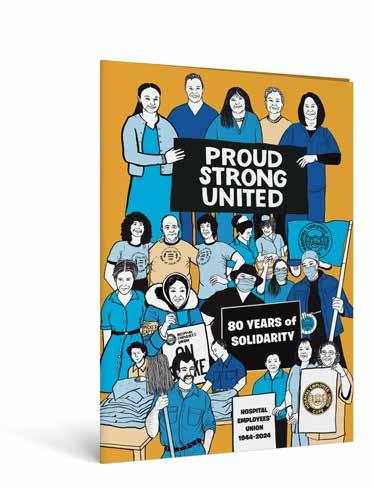
Job actions are often about contract negotiations, but sometimes HEU members come together to support an injustice against their fellow workers.
In 1973, workers at Mills Memorial Hospital in Terrace swiftly rose up to advocate for a hospital janitor, Douglas Pigeau, who had been fired by an anti-union administrator. Pigeau, who was deaf and non-speaking, had worked at the hospital for five years. He and his co-workers had developed alternative ways of communicating, and he had their respect and support.
When the news of his firing spread, hospital workers were outraged.
There had been tensions between administration and Pigeau, who had filed complaints about excessive workload, and had also received warnings about signing out early.
But firing him, his co-workers believed, was very unfair.
So 46 HEU members staged a two-day sit-in, and refused to work until the hospital reinstated Pigeau.
The case went to arbitration. The arbitrator ultimately decided in support of reinstating Pigeau, and urged the employer to “expend the substantial effort to do all that can reasonably and properly be done” to accommodate Pigeau in the workplace.
But his co-workers, the abritrator decreed, would not be compensated for the two days of lost work.
Ray McCready, HEU’s secretary-business manager, argued in the hearing that members had jeopardized their jobs to help a fellow employee. But, he said, “I remember [the arbitrator] saying they would have to wait for the next life to get their reward.”
BOOKS and POSTERS
will be available at HEU events and meetings throughout the year, or at the Provincial Office.
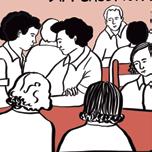
1930s and 40s: Tough times
It’s the Great Depression and one third of Canadians are unemployed. But workers at Vancouver General Hospital risk their jobs to organize a union. HEU is founded in 1944, starting with just 400 members.
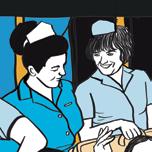
Now in 19 hospitals, the union begins a job classification project, holds conventions, and bargains groundbreaking benefits like pension and superannuation plans, accumulative sick leave, employer-paid medical coverage and holiday pay.

Medicare comes to Canada. More hospitals are built, health care workers are hired, and the union expands. HEU begins regional bargaining and in 1968 achieves its first province-wide agreement covering all hospitals in B.C.
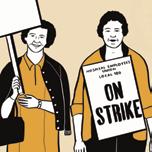
1970s:
A growing economy empowers workers, but Inflation, wage and price controls and regressive labour laws lead to conflict. HEU has its first province-wide hospital strike in 1976. The union also turns its attention to pay equity, and organizing the long-term care sector.
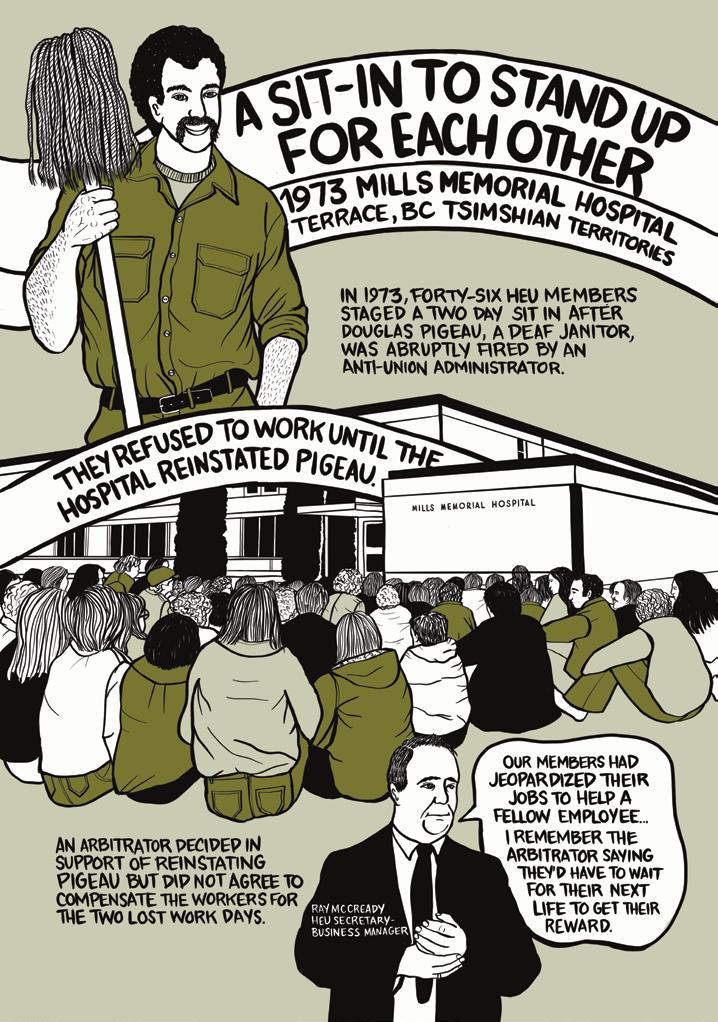
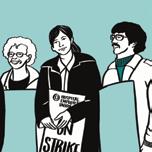
1980s: Cutbacks fightback!
An economic crash in the early ‘80s triggers a wave of unemployment. Government responds with massive spending cuts and rolls back bargaining rights — setting the stage for a tough decade for unions and workers.

A decade of relative stability. Public sector bargaining associations and regional health boards are formed. HEU finally wins pay equity in its collective agreement, and establishes its own equity committees.
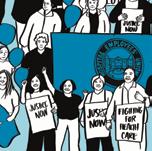
The BC Liberals tear up HEU’s collective agreement, fire 8,000 health care workers, and gift thousands of hospital jobs to global corporations, undoing years of progress. The union digs in to fight.
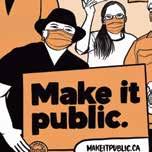
After 16 years of HEU re-organizing workers and fighting privatization, in 2018 the newly-elected NDP government repeals the BC Liberal laws. This opens the door for our “Make it Public” campaign to get private contractors out of the hospitals.

2020s: What’s ahead?
Halfway through this decade we’ve navigated a worldwide pandemic, reversed privatization in hospitals, bargained a groundbreaking FBA contract, and turned 80 years old – strong, proud and united.
FULL-TIME OFFICERS

PRESIDENT Barb Nederpel clerk/care aide
Kamloops/ Thompson Local
VICE-PRESIDENTS

TRUSTEES

Bill McMullan 1ST VICEPRESIDENT residential support worker
Kardel Local

Chris Batting SENIOR TRUSTEEhousekeeper Adanac Park Lodge Local

SECRETARYBUSINESS MANAGER
Lynn Bueckert

Talitha Dekker
2ND VICEPRESIDENT
accounts receivable clerk
Kamloops / Thompson Local

REGIONAL VICE-PRESIDENTS





FRASER
Bonnie Hammermeister care aide
Surrey Local
INTERIOR
Barb Shukin activity worker
F.W. Green Local
NORTH
Lisa Crema
mental health / life skills support worker
Prince George Local
VANCOUVER COASTAL
Ranjit Uppal OR booking/ slating clerk
PHSA (Amalgamated) Local
VANCOUVER ISLAND (North)
Phil Henderson
cook
Trillium Local

FINANCIAL SECRETARY
Betty Valenzuela health records clerk
Vancouver General Local

Olivia Burgon SENIOR TRUSTEEELECT rehabilitation assistant
Queens Park Local




FRASER
Diane Tomei pharmacy technician
Chilliwack Amalgamated Local
INTERIOR
Baljit Sandhu health care assistant Vernon Local

Charlotte Millington
3RD VICEPRESIDENT
technical analyst
Royal Jubilee Local
Lisa Kreut TRUSTEE stores attendant
Vancouver General Local


NORTH
Tammy Meise life skills support worker
Prince George Local
VANCOUVER COASTAL
Ethel Purugganan clerk
Normandy Local


FRASER Shivonne St. Pierre care aide
Menno Home Local
INTERIOR Kim McIlravey care aide
100 Mile Local
VANCOUVER COASTAL
Maria Lugs care aide
Richmond Local
VANCOUVER ISLAND (South)
Anna Caldwell care aide
Victoria General Local
DIVERSITY VICEPRESIDENTS






Lynn Serhan INDIGENOUS PEOPLES care aide
Armstrong Local
Cora Mojica
ETHNIC DIVERSITY
food service worker
Vancouver General Local
Darlene Bown PINK TRIANGLE care aide/porter
Victoria General Local
Belina Fernandez 2-SPIRIT, WOMEN, NON-BINARY care aide
Victoria General Local
Jovito Espinoza PEOPLE WITH DISABILITIES distribution attendant PHSA (Amalgamated) Local Leanne La Guardia YOUNG WORKERS stores attendant PHSA (Amalgamated) Local
HEU’s Provincial Executive (PE) is elected by convention delegates every two years. The PE is responsible for implementing the goals and policies set by HEU’s membership, and guiding the work of the union between conventions.
PE members represent all regions of the province, and come from a variety of occupations and sectors.
October 13, 2024 marked HEU’s 80th anniversary, and locals across B.C. gathered to celebrate the milestone. As part of the festivities, 30 locals participated in “The Great HEU Cake Off,” a cake decorating contest that turned a sweet treat into a creative display of union pride.
The cakes, which ranged from colourfully whimsical to deeply meaningful, were judged by former HEU secretary-business manager Judy Darcy. As she went through each submission, she was amazed by the creativity and effort members poured into their cakes. Though it was a challenging task, she managed to select six winning locals, with the grand prize going to Three Links Local.



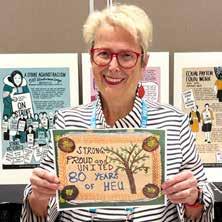
Regional winners included Malaspina Mid Island (Vancouver Island), Quesnel (North), BCC (Vancouver Coastal), Kamloops/Thompson (Interior), and Morgan Place (Fraser), each telling their own story of what HEU’s 80th anniversary means to them.










Conservative’s policies will benefit private sector at workers’ expense
WITH Prime Minister Justin Trudeau’s resignation, a federal election could be called as early as April.
Job security and wages, public health care and housing are key issues that matter to HEU members. And most if not all these issues are at stake in this election.
But with the Liberals firmly in third place, the race for seats in B.C. is between the opinion-poll leading Conservatives under Pierre Poilièvre, and the second-place NDP, led by Jagmeet Singh.
That leaves many HEU members asking who is Pierre Poilièvre and what is his Conservative party’s agenda?
From what’s in the media, Poilièvre has undergone a makeover that positions him as a friend of working people, railing against
Poilièvre offers simplistic solutions for complex challenges, while claiming to stand up for working people.
“elites” and offering what he calls “common sense” solutions.
Some critics, however, argue this is “fake populism”, rather than a sincere commitment to working people.
Journalist Martin Lukacs describes fake populism as “when
politicians ride ordinary people’s outrage against the establishment into office, then hand the keys to the one per cent.”
Poilièvre’s record shows hostility to workers and unions. He fought card-check legislation that makes it easier to organize, and pushed for so-called “right-to-work” legislation that makes it harder for unions to collect the dues they require to effectively advocate for their membership.
Poilièvre is also a staunch advocate of privatization. He has boasted that he wants to “free up the economy, privatize more.”
Provinces depend on transfers from the federal government to fund public health care. In 2004, a ten-year deal was negotiated between Ottawa and provincial and territorial governments that guaranteed six per cent annual increases in transfers.
But in 2014, when Poilièvre was a key cabinet member of Prime Minister Stephen Harper’s Conservative government, Ottawa refused to negotiate a new deal and let it lapse.
Poilièvre’s solution is to push for a greater role for the private sector. Two-tier health care will favour private profit over quality public care, worsening access and outcomes for working people, while the wealthy jump to the front of the queue.
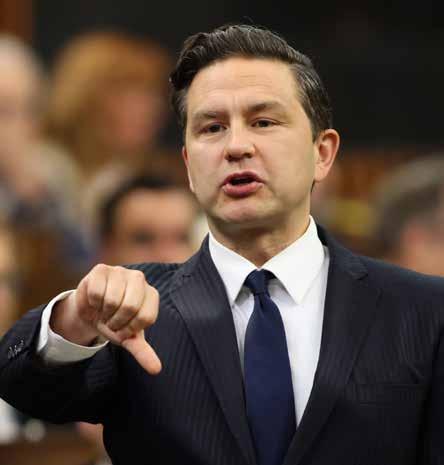
And on housing, Poilièvre has voted no less than seven times against measures to address housing affordability. He has vowed to cancel Ottawa’s $4 billion Housing Accelerator Fund, designed to assist municipalities in building housing-related infrastructure.
Overall, Pierre Poilièvre offers simplistic solutions for complex challenges, while claiming to stand up for working people. But under-
neath the rhetoric, his approach will benefit the rich and powerful at the expense of working people. But as political historians note, a Conservative government is not a certainty in the next federal election. And with so much at stake, B.C. – as we saw in the last two federal elections – can make the difference between electing a majority or minority government in Ottawa.
OUTGOING B.C. Minister of Health Adrian Dix will be remembered for overseeing two historic events: the global COVID-19 emergency and undoing the destructive contracting-out policies of the BC Liberals.
Tireless and determined, Adrian was one of the greatest defenders of public health care we have seen. The introduction of legislation repealing Bills 29 and 94, carried live into HEU’s 2018 Convention, was greeted with an extraordinary outpouring of emotion—of joy, relief and pride, and a reaffirmation of the transformative power of solidarity.
His tenure saw the hiring of 43,000 health care workers, including 8,000 new care aides. He brought 5,000 HEU members back into the public system; increased members’ wages; invested nearly $6 billion in seniors’ care and in six new hospitals, while initiating expansions for 17 hospitals. It is an extraordinary
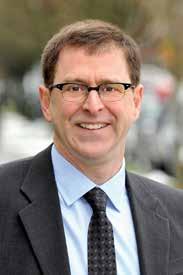
record of achievement.
Adrian’s response to the pandemic has been noted repeatedly for its success, especially in the most uncertain and dangerous early months. Despite relentless stresses and pressures, he worked calmly, decisively and tirelessly to prevent an overwhelming heath care emergency.
Adrian Dix served British Columbians for more than seven years. In perilous times, he was the greatest friend public health care, workers and HEU members could ask for.
As we look forward to working with incoming Health Minister Josie Osborne, we say goodbye to Adrian with admiration and gratitude.
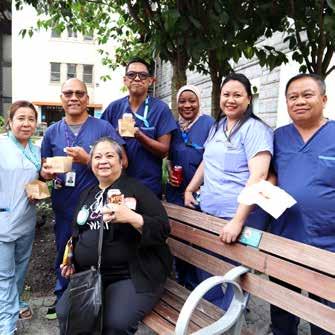
When Vancouver General Hospital (VGH) local chair and provincial executive member Lisa Kreut reflects on building a stronger local, it all comes down to fostering a culture of ownership that facilitates local activism, rather than relying on a few individuals to do all the work.
“We’ve been working on shifting the relationship that we have as executive and stewards from a transactional approach towards one of ownership,” she says.
Instead of members coming from a perspective that they pay dues and in return receive services, the VGH local executive aims to empower members to take leadership roles in organizing events and accessing resources.
In turn, the approach has helped the local move away from a top-down structure where most of the decisions were made by a few. Plus, this flattening of the hierarchy has increased transparency and the discovery of hidden expertise among members says Kreut.
But to create a culture of ownership, you need to first of all be willing to let things not happen, says Kreut.
“You need to accept that some things not getting done is a possibility at first, while at the same time trusting that your members will step up and into leadership roles. Only then can members show they’re willing and able to organize.”
Like many HEU members, Jen Rotar juggles her family, union and work duties, and lifts spirits by bringing a little joy to everything she does.

Health minister appointed B.C. has a new Minister of Health.
Josie Osborne, MLA for Mid IslandPacific Rim, was appointed following the re-election of the NDP provincial government last October.
Osborne was first elected in 2020, and has a background in municipal governance. A longtime resident – and onetime mayor — of Tofino, she hopes to bring her knowledge of rural and remote communities to her new role.
Former Minister of Health Adrian Dix has been appointed Minister of Energy and Climate Solutions.
For HEU member Jen Rotar, laughter is truly the best medicine. Whether she’s assisting a member on their journey back to work as an Enhanced Disability Management Program (EDMP) steward or cracking a joke with her family, Jen’s always lifting the spirits of those around her.
Jen joined HEU in 1998, when she started as a rehabilitation assistant at Swan Valley Lodge in Creston. Encouraged by a colleague, she became active in her local’s executive and the Joint Occupational Health and Safety committee. Her dedication eventually led to her current role as an EDMP steward, helping members navigate medical leave and return to work after an injury or illness.
Part of what makes her instrumental in supporting her patients and HEU members in their recovery is her ability to find joy wherever possible.
“It was the highlight of their day because we were joking around and having fun,” she recalled from her time as a rehabilitation assistant.
Jen’s life outside work is equally rewarding. Her 16-year-old son, who was drafted into the Western Hockey League, keeps her busy cheering from the sidelines, while her 13-year-old daughter keeps her on her toes with her quick wit and sense of humour.
“She’s very much like me. She’s hilarious, and I think I’m funny,” she shares, and we both laugh.
When she’s not busy being a mom, Jen unwinds with her husband who also shares her sense of humour.
Even during life’s challenges, there’s always room for connection, compassion, and laughter. “Do something that makes you happy.”
“I find just jabbering at my husband and bugging him kind of just helps me leave my work stress behind.”
Her advice for fellow HEU members is simple but profound: “Put work away and go do something that makes you happy, whatever that is.”
Through her commitment to helping others and her ability to find joy in the everyday, Jen inspires those around her, showing that even during life’s challenges, there’s always room for connection, compassion, and laughter.
MAÏA SAMPSON
Former HEU leader Jennifer Whiteside has been appointed Minister of Labour in the new BC NDP government elected last October.
Whiteside served as the union’s secretary-business manager from 2015 until 2020, when she was elected MLA for New Westminster. She was first appointed Minister of Education, and in 2022 became Minister of Mental Health and Addictions.
She succeeds former NDP MLA Harry Bains, who held the Labour post since 2017.
Two physician assistants have been hired at Saanich Peninsula Hospital ER in a one-year pilot project. This is the first time the profession has been approved to work in a B.C. hospital.
Physician assistants (PAs) are medical professionals who work under the supervision of physicians. While they do not possess a medical degree, they are educated through a two-year graduate program under the same medical model used to train doctors. They can conduct patient inter-
views, provide physical examinations, perform diagnostic and therapeutic interventions, prescribe most medicines, order and read tests, and make referrals under the guidance of a physician.
Unlike nurse practitioners already working across B.C., physician assistants cannot operate independently from a doctor. The physician’s college says PAs are currently only permitted in emergency departments in B.C.
Alberta, Manitoba, Ontario and New Brunswick have already approved the use of PAs.

The Great White North is world-renowned for its winter season. While some Canadians prefer hibernating in the warm indoors, others excitedly participate in many outdoor activities in the snow, rain, ice, sleet or hail. How well do you know winter sports in B.C.?
Being a bargaining committee member means tough work and long hours, and these HEU members from our three public sector bargaining associations are among those who’ve taken on the challenge.
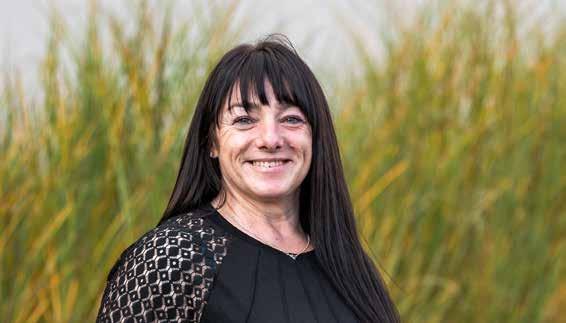
d) Snowboarding 1 2 3 4 5
This sport involves travelling down a curvy, icy track faster than a rollercoaster in a vessel that holds up to four people
a) Tobogganing b) Bobsleigh
c) Luge d) Skeleton
What is the biggest ski destination in B.C.?
a) Revelstoke Mountain Resort
b) Big White Ski Resort
c) Whistler Blackcomb
d) Apex Mountain Resort
A skip is the leader of this popular sports team.
a) Curling
b) Hockey
c) Figure Skating
d) Freestyle Moguls Skiing
The PWHL begins its second season in 2025 in what sport?
a) Speedskating
b) Pickleball
c) Wheelchair Curling
d) Hockey
These athletes slide down a winding track on a sled head-first.
a) Bobsleigh
b) Luge
c) Skeleton
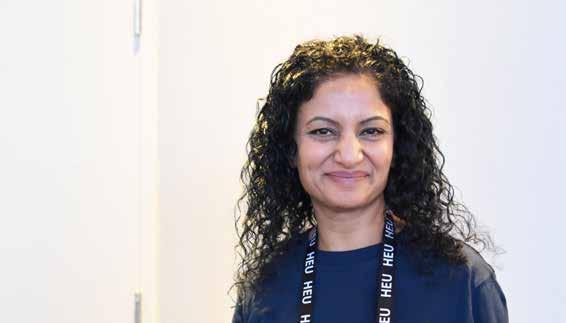
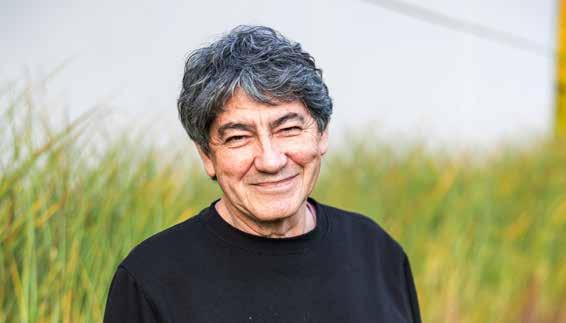

Chief engineer Lorne Pachara retired from East Kootenay Regional Hospital in September, where he worked for more than 48 years.
Lorne’s work ethic was exemplary. He spent his entire career working in the same building, a place he took pride in, and he always encouraged others to take pride in their work. Lorne was always ready to help at a moment’s notice, even after his shift.
“It was never a job, but a lifestyle,” says Lorne. “Our job is just as important as nurses and doctors by keeping the hospital facility running.”
Regarding retirement, Lorne says “It’ll never be a good time to go.”

In December, Joyce Beddow Buckland suddenly passed away. She worked as a care aide at Ashcroft and District General Hospital for more than 30 years before retiring in 2017.
Active in her local, Joyce was a shop steward, and chair, as well as a Labour Council Delegate and an OHS Steward. She was on the bargaining committee for multiple years, and attended many workshops, regional meeting and conventions. In 2018, Joyce won the Mary LaPlante Sisterhood award.
Joyce was an amazing mentor and community leader. She was a political activist and volunteered for the NDP as well as various charities. In 2017, Joyce accepted a two-year appointment to the Board of Directors of Interior Health.

In October, Shawn Code, a care aide at Kelowna General Hospital, passed away. An HEU member for more than two decades, Shawn worked his way through support services and stores before becoming a care aide in the ICU.
Shawn loved boating and camping, and spending time with his family. He was a softball coach and had a passion for music. He loved a good concert and could almost always be found air-drumming to his favourite Rush songs.
“Shawn was a deeply caring man who always had a smile on his face,” recalls a co-worker. “His genuine warmth and generosity left an indelible mark on everyone he met. He always had a way of making you feel loved and connected.”

Longtime activist Lynn Holden passed away suddenly at the end of September. After starting as a clerk, she quickly transitioned to medical imaging where she remained for the rest of her career at Burnaby Hospital.
For more than 34 years, Lynn was active on her local executive. She served as vicechair, shop steward, and OH&S steward, as well as secretary and trustee. Lynn was also a JOHS committee worker representative and sat on many committees, including the PE occupational subcommittee, the 2-Spirit, Women & Non-Binary and the Indigenous Peoples standing committees.
A dedicated HEU member, Lynn attended many conventions, workshops and educational opportunities, and was a tireless advocate for her fellow members, ensuring fairness and upholding employment rights.
Outside of work, Lynn enjoyed road trips, spending time with her family and friends, and pursuing continuous education and growth opportunities. She was also actively involved in Scouts Canada and her local church.
Lynn is remembered as a kind and generous person who brought joy and positivity to those around her. She embraced life fully and had an ability to lift others with unwavering support, generosity and laughter.

Recently retired as a housekeeper at Dr. F.W. Green Memorial Home, Betty Lyttle passed away in September. She had previously worked at East Kootenay Regional Hospital. Betty was a trustee and OH&S steward at her local.
Suffering from Graves disease, Betty required medical treatments that were only available in Calgary. Her local raised funds to help support her travel and accommodations.
“We will never forget her big heart,” says a co-worker. “She was a beautiful person inside and out and was loved by everyone.”

Joseph Creek Village care aide Angela Wagstaff sadly passed away in November.
According to colleagues, Angela always had a smile on her face and was dedicated to the seniors she provided care for with a huge heart.
Loved by staff and residents, Angela made some lifetime friends at work.
Known for her sense of humour and generosity, she was always ready to lend a hand to those in need.

Did you know that HEU has six equity standing committees? Working with HEU’s equity officer, they provide outreach and advocacy to HEU members, and work in solidarity with other social justice groups. To learn more, please email inclusion@heu.org.
Ethnic Diversity • Indigenous Peoples • Older Persons • Pink Triangle • People with Disabilities • 2-Spirit, Women and Non-Binary • Young Workers
EDITOR
Neil Monckton
MANAGING EDITOR
Elaine Littmann
ASSOCIATE EDITOR
Brenda Whitehall
GRAPHIC DESIGNER
Elaine Happer
PRINTING
Mitchell Press
PROVINCIAL EXECUTIVE
BARB NEDERPEL President
LYNN BUECKERT
Secretary-Business Manager
BETTY VALENZUELA Financial Secretary
BILL MCMULLAN 1st Vice-President
TALITHA DEKKER 2nd Vice-President
CHARLOTTE MILLINGTON 3rd Vice-President
CHRIS BATTING
Senior Trustee
OLIVIA BURGON
Senior Trustee-Elect
LISA KREUT
Trustee
BONNIE HAMMERMEISTER
Regional Vice-President
Fraser
DIANE TOMEI
Regional Vice-President
Fraser
SHIVONNE ST. PIERRE
Regional Vice-President
Fraser
BARBARA SHUKIN Regional Vice-President
Interior
BALJIT SANDHU Regional Vice-President
Interior
KIM MCILRAVEY
Regional Vice-President
Interior
LISA CREMA
Regional Vice-President
North
TAMMY MEISE
Regional Vice-President
North
MARIA LUGS
Regional Vice-President
Vancouver Coastal
RANJIT UPPAL
Regional Vice-President
Vancouver Coastal
ETHEL PURUGGANAN
Regional Vice-President
Vancouver Coastal
ANNA CALDWELL
Regional Vice-President
Vancouver Island (South)
PHIL HENDERSON
Regional Vice-President
Vancouver Island (North)
LYNN SERHAN
Diversity Vice-President
Indigenous Peoples
CORA MOJICA Diversity Vice-President
Ethnic Diversity
DARLENE BOWN Diversity Vice-President Pink Triangle
BELINA FERNANDEZ
Diversity Vice-President 2-Spirit, Women and Non-Binary
JOVITO ESPINOZA Diversity Vice-President People with Disabilities
LEANNE LA GUARDIA Diversity Vice-President Young Workers
HEU OFFICES
PROVINCIAL OFFICE
5000 North Fraser Way Burnaby V5J 5M3 604-438-5000 1-800-663-5813
EMAIL heu@heu.org
WEB www.heu.org
REGIONAL OFFICES
Vancouver Island
VICTORIA 201-780 Tolmie Avenue Victoria, V8X 3W4 250-480-0533 1-800-742-8001
COMOX 6-204 North Island Highway Courtenay, V9N 3P1 250-331-0368 1-800-624-9940
Interior
KELOWNA 250-1815 Kirschner Road Kelowna, V1Y 4N7 250-765-8838 1-800-219-9699
NELSON 745 Baker St. Nelson, V1L 4J5 250-354-4466 1-800-437-9877
Northern PRINCE GEORGE 1197 Third Ave. Prince George, V2L 3E4 250-564-2102 1-800-663-6539
HEU is a member of the

